
In the late ’50s, when my friend and I were about 12, baseball dominated our lives. We rode our bicycles to school, to Little League, around the neighborhood and we always found a baseball game. We never tired of playing the game or practicing and honing our skills.
At the end of the long driveway at my friend’s house, where the driveway ended and the backyard started, was a huge old half-dead walnut tree. Under it was where we played catch. Quite by accident we invented a game that we later named “tree outs.” The name sounded like “three outs” and the basics played much the same as “three flies up” except that the tree was in play.
Standing on either side we could whip grounders to each other or back up and chuck a high fly ball over the top. Grounders were worth 25 points, a fly was 100 and if you missed the points counted against you, so calculating the bounces in the limbs was imperative. We knew how to compute the ricochet off every branch the way a billiard player knows the rebounds off the cushions of a pool table.
On a Wednesday in the middle of a game of “tree outs,” Uncle David and The General rode their motorcycles down the driveway and parked by the back door of the house. Throwing our mitts to the ground we both ran excitedly over to them hollering their names loudly enough for my friend’s mother to come rushing out of the kitchen. Being the two most invigorating and motivating people alive, Uncle David and The General were also the best story tellers.
We ran around the men wildly, getting playfully thrown over their shoulders, roughed up and ended up sitting on top of the two great motorcycles when they finally went into the kitchen with my friend’s mom. Perched on the motorcycles, fiddling with the controls, we watched through the screened porch as they all talked, drank coffee and smoked cigarettes.
Uncle David met The General the day after “D Day,” during the invasion of Europe at Normandy and he had known my friend’s mother before the war even before she had married my friend’s father.
But when he came home the war had changed him and things at home were seen in a different light. He decided not to marry. In fact neither man had married. They said they had enough family with their friends, so they both were confirmed old bachelors who got together once a month to ride motorcycles and go on trips.
Uncle David wasn’t anyone’s real uncle; that is just what we called him and now that I think of it, I doubt The General was really a general but none of that made any difference. Everyone was always glad to see them and it was agreed that they never came often enough.
It was early afternoon when they rolled their big motorcycles into the driveway. After coffee and talk, my friend’s mom changed her dress for some pants and went for a ride with The General while Uncle David sat in a chair under the walnut tree and listened to us beg him for stories. “What do you want to hear about?” He asked. “Tell us how you met The General.” “You’ve heard that one a dozen times.” “We know, but it’s our favorite.” And with that Uncle David took out a pack of Chesterfields, lit one with a Zippo and started in.
It was always the same. He was a dispatch rider and had been issued a WLA Harley motorcycle. On the morning of the second day of the invasion at Normandy, the beaches were no longer “hot” and the Allies started unloading equipment, tanks, jeeps, half-tracks, amphibious ducks and Uncle David’s Harley.
His stories were never morbid. They were always about how soft the beach was and about when the bike got bogged down in the sand and about the fact that no one was in charge of anything and how screwed up it was. The way he told it everything was funny and just a big mess.
Uncle David met The General when the Allies broke out of the beaches and started pushing the Germans back through the “hedgerow country.” They were both dispatch riders and their first assignment was to ride east to find how far the Germans had retreated and where the new command post was.
Uncle David got lost but The General found the new command post, returned to base camp with a shot-up motorcycle and a wounded man on the back. For that he was awarded the Silver Star. Uncle David made getting lost sound funny and laughed, “I’d got the Silver Star if I’d had a compass.” It was hilarious and always made us laugh.
When my friend’s mother got back from her motorcycle ride with The General, she got on Uncle David’s motor and they took off.
As soon as they left we begged for stories. The General told good stories but never anything about the war. His stories were about motorcycles and motorcycle trips.
“OK, what do you want to hear about? What story did David tell you?”
We told him in infinite detail about how the two of them had met in Normandy and how funny his story had been. The General took a long breath, didn’t say anything, sat down where Uncle David had sat, lit a Chesterfield, looked into the fog of the smoke, became absorbed, slipped back a dozen years and for the first time told the real version about the day he met David. It wasn’t funny. His version was unspeakably horrible, gory and bloody, there were bullets and explosions, maimed men were dead and dying and as he told it tears ran down his face. There was another important difference between Uncle David’s story and his. It was he that got lost; Uncle David had won the Silver Star and brought the wounded man back on a shot-up Harley. And the wounded man was The General.
When Uncle David and my friend’s mother got back from their ride they were surprised that we were not playing catch. The three of us were quietly sitting under the walnut tree.
My friend and I never spoke of The General telling his war story until several years later, when in high school history class we studied World War II. Under the walnut tree we sat talking quietly, wondering about death and killing and how it changes those who survive a war. We tried, but we were too young to understand.


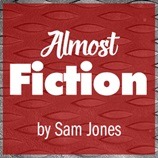
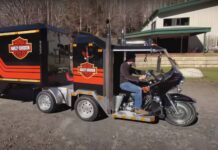
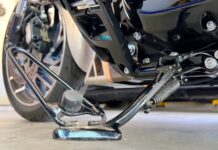
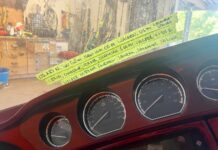
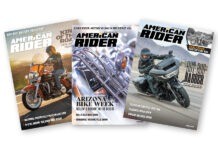
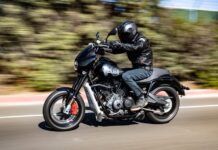
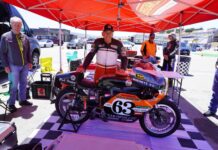










[…] for the story of Uncle David and the General. My father was an MP and dispatch rider during WWII at the Normandy invasion. I gave this pic to […]